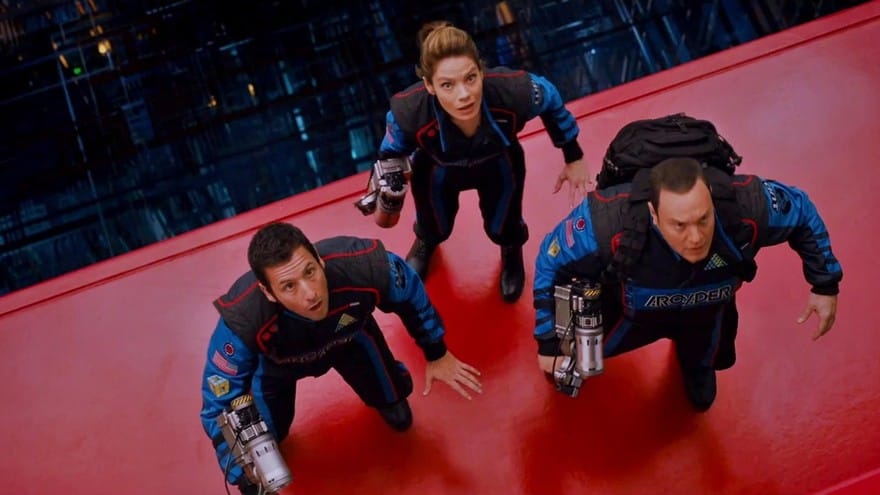Pixels is the worst

At its best, nostalgia is a force that resuscitates old forms and shows us why they were valuable in the first place—what they did that was novel; what they did that was timeless. At its worst, nostalgia is just a sugarcoated version of reactionary wish-fulfillment: a way for people—most likely, old white men—of arrested development and backward ideology to return to the world that made them feel special. At its best, nostalgia is Yooka-Laylee, or at least what Yooka-Laylee promises to be: a return to the 3D platformers of the late-90s that makes a new argument for their collect-a-thon simplicity and googly-eyed sensibility. At its worst, nostalgia is PIXELS.
I did not have high expectations for PIXELS. No one should have high expectations for PIXELS. It’s an Adam Sandler movie about an alien invasion in which the aliens have modeled themselves after classic arcade games such as Galaga, Space Invaders, Centipede, and PAC-MAN. It’s directed by Chris Columbus. Kevin James plays the President. I repeat: no one should have high expectations for PIXELS. But I think expectations are actually the biggest problem here; they are what makes it a Trojan horse. You expect a dumb but ultimately superficial middle-aged bro comedy subsisting on throwback references to that manufactured collection of worn-out tropes called “the 80s.” You expect Hot Tub Time Machine. You expect it to be bad. You don’t necessarily expect it to be ugly: bitter, resentful, masturbatory, unbelievably sexist.
The movie’s throwbacks aren’t strictly limited to arcade games. In a broader way, against an Independence Day backdrop, it tries to resuscitate and combine two 80s master-plots: slobs vs. snobs and revenge of the nerds. On the one hand, it’s about a couple of poor everyman schlubs proving that they’ve got more heart (and balls) than the suits in power. Yes, one of these schlubs is the President of the United States, but that just means he’s like our last President: a lovable idiot who produces a lot of gaffes until the public learns to appreciate his down-to-earth charm. (At the end of James’s character arc, after he’s helped save the world, the press corps excoriate a fellow journalist for trying to trip him up with big words like “laudata.”) On the other hand, these same everyman schlubs are also nerds, which means they’re supposed to be outcasts, “losers,” fighting an uphill battle for social and romantic legitimacy.

We meet Sandler’s character when he’s a kid in 1982, better than almost anyone else at arcade games. He attends the World Videogame Championship, a room full of cabinets where proto-booth babes wander the floor and Dan Aykroyd dispenses expository dialogue about how the event will be taped and launched in a NASA time capsule. Fast forward to 2015 and Sandler is working for “Nerd Brigade” (i.e. Geek Squad), installing TVs and PS4s for snotty little Generation Y kids. He meets Michelle Monaghan, a single mom whose husband left her for a 19-year old named “Sinnamon,” and is offended when she doesn’t immediately recognize how nice a guy he is. He calls her a snob. “I bet you’d kiss me if we were on a yacht drinking champagne,” he says. You’re missing out, he says: “I’m an amazing kisser. All us nerds are. Because we appreciate it more.”
Here’s the thing: this almost-kiss moment, in which Sandler finds Monaghan “crying and drinking” in the closet (as women do), he comforts her with the tremendous sympathy of “alternative masculinity,” and sharply rebukes her for not putting out—this happens within roughly 15 minutes. This is not a movie that builds up to the revelation that these slob-nerds who ruled the ‘cade in 1982—Sandler, James, plus Josh Gad and Peter Dinklage—ought to rule the world in 2015. Let me reiterate: Kevin James is already President. There is no persecution. There is almost no opposition from the camp of “traditional masculinity,” save some disgruntled barks from hawkish military officials played by Brian Cox and Sean Bean, who have zero effect on the plot. Almost the entire movie is a seamless, uninterrupted handjob for the small group of chubby white men whose skillset is demanded by the aliens. Everything revolves around them, everything confirms their worldview, and everything rewards them. The centerpiece of the movie is a shot of Sandler astride an IRL version of one of the mushrooms from Centipede, discharging a huge light cannon from his pelvic region. “You just need to channel your genius into something productive,” young James tells him early on. Well, there you go.
So how do women fare in this movie? Here’s a short list.
– Monaghan works for DARPA, but is primarily interested in developing a “slut-seeking missile” to destroy Sinnamon.
– Sandler, a complete stranger, admits to her that when he heard that her husband had left her for a 19-year-old, he expected her to be “one of those ‘hot when we met in high school but then let yourself go’ types.”
– “She went from 0 to psycho in 3.4 seconds,” he tells the audience, commenting on her driving.
– On Monaghan in the Situation Room: “Does she really get to talk twice? She’s not even at the grownups table.”
– James, the President, is struggling to fit “quality time with the wife” into his busy schedule. We later find out that “quality time with the wife” means helping her bake a cake.
– Here’s something James, the President, says to the Prime Minister of the U.K.: “Well, your husband must’ve seen something in you that other men don’t see.”
– By the first act, Sandler’s romance with Monaghan is a foregone conclusion, but he really clinches the deal when he intuits that she, a high-ranking DARPA official, might feel better about her life if she could nitpick Sinnamon’s appearance. “I guess her eyes are a little far apart,” she says. At this point she happily chugs a Bud Light, because she is also a chick who can hang.
– Even Sandler is initially put off by Josh Gad’s multi-decade obsession with a fictional arcade-game avatar named Lady Lisa. He has adorned his basement lair with her image, and has made dozens of hand-drawn flipbooks in which she becomes real and they have sex. By the end of the movie, Gad is rewarded with a real-life version of Lady Lisa who falls in love with him instantly and is, quite literally, a trophy.
– Peter Dinklage plays a convict with a nonsensical accent who agrees to save the world on the condition that he can have a threesome with Serena Williams and Martha Stewart—the latter partly because “at least she’d make me a panini or some shit.” His wish comes true.

PIXELS is self-aware about its premise being a contrived form of wish-fulfillment: the movie takes great conceptual pains to imagine the kind of ultraspecific situation in which burnouts who were good at PAC-MAN could become, as James puts it, “American heroes—world heroes” (because of course the terms are interchangeable). You would think, given the number of times the movie praises these games over their “modern” equivalents, that the ultimate aim would be a defense of arcade logic and arcade culture—a reminder of what makes them classic. Nope. Sandler spends plenty of time criticizing the generic third-person shooter that Monaghan’s son plays on his 4K TV: instead of having a pattern, it’s chaotic; instead of mercilessly limiting you to three lives, it lets you restart from a checkpoint; instead of being a “social” experience “outside your house,” it lets you be a hermit. But neither he nor the movie as a whole has any coherent argument for why arcade games are, by contrast, socially or culturally valuable; in fact, the sheer contrivance of the premise does a much better job arguing for their irrelevance. Stare at the simple elegance of PAC-MAN for thirty seconds and you’ll have a better understanding of why it’s great. This movie assumes that it would take an alien invasion—an impossibly fair and rule-bound alien invasion—to legitimize games that are already legitimate by turning play into work. Not once does it consider the possibility that play might be valuable because it is play, i.e. not work.
But PIXELS is not about the games. It’s about the men. (Sound familiar?) It’s about middle-aged white men yearning for a world in which women are prizes, other cultures are absurd (aside from ugliness, the primary trait of that British PM is that she’s incomprehensible), and all forms of recreation that they enjoy are important enough to save the world. The games merely offer the pretext for an astonishingly transparent power fantasy of cultural, political, and sexual reclamation. Early on in the movie, the young version of Peter Dinklage looks away from the arcade cabinet to grab a quick Polaroid of the booth babes who stand fawning behind him. Nothing is creepy about it; it’s one of the entitlements of elite gamerdom in this simpler time, this better time. That’s PIXELS in a nutshell. And that’s nostalgia at its most pernicious. An attachment to the object provides an excuse to indulge the ego. A desire to excavate pop culture masks a desire to excavate something larger: a worldview, a politics, a hierarchy. The illusion of play—the premise that this is all just a daydream of wistful recollection, a return to childhood—disguises ideological work of the most serious, damaging kind.



